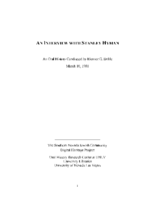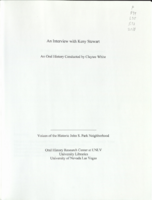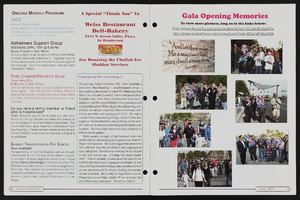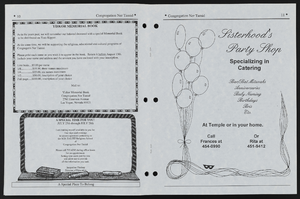Search the Special Collections and Archives Portal
Search Results

Transcript of interview with Thalia Dondero by Susan Scott, March 18, 1978
Date
Archival Collection
Description
On March 18, 1978, Susan Scott interviewed Thalia Dondero (born 1921 in Greeley, Colorado) about her experiences in Nevada and more specifically about her work as a Clark County Commissioner. Dondero first speaks about her background and the circumstances which led her to move to Las Vegas. She also talks about her children, her work with the Parent-Teacher Association, and her service with the Nevada State Park Commission. She also mentions some of her lobbying work for the development of state parks, including a project by National Geographic in which she visited multiple parks, and she later describes the development of the Las Vegas Strip. At the end of the interview, Dondero talks about her involvement in various organizations, her consideration for running for governor, and some of the topics she handles as a commissioner for the county.
Text

Transcript of interview with Stanley Hyman by Eleanor Doble, March 10, 1981
Date
Archival Collection
Description
Interview with Stanley Hyman by Eleanor Doble on March 10, 1981. In this interview, Hyman discusses his job as a district manager for Farmers Insurance group, which brought him to Reno, Nevada in the 1940s, then to Las Vegas in 1951. He talks about the population growth of Las Vegas, and comments that the infrastructure of the city did not improve with the population growth. He also talks about some local disasters, the economy, entertainment, and the convention business in the area. He speaks briefly about recreation at Lake Mead and Mount Charleston, and atomic tests. The interviewer asks about women in leadership positions in hotels and in the insurance business.
Text

Transcript of interview with Ruth E. Hazard by Jeff Crampton, March 27, 1977
Date
Archival Collection
Description
On March 27, 1977, collector Jeff Crampton interviewed accountant, Ruth E. Hazard (born June 25th, 1907 in Marshall, Michigan) in Las Vegas, Nevada. The interview takes place at the collector’s home and offers an overview of life in early Las Vegas from 1931 to 1977. The interview concludes with a discussion on local atomic testing.
Text
Thalia Dondero Political Papers
Identifier
Abstract
The Thalia Dondero Political Papers (1934-2003), contain correspondence, pamphlets and reports used by Dondero to conduct official business, as well as information on county and city budgets, social and health services, liquor and gaming, planning, public works, environmental impact reports and a large section on water management. Dondero served as a Clark County Commissioner for twenty years and engaged in numerous other civic and political activities. The bulk of the materials are derived from Dondero's last four years in office, 1990-1994, but a few items from Dondero's earlier career are included.
Archival Collection

Transcript of interview with Morris "Moe" Dalitz by Brenda Baxter, November 4, 1977-March 30, 1978
Date
Description
Interview with Morris "Moe" Dalitz by Brenda Baxter, on several dates in late 1977 to early 1978. In this interview, Dalitz talks about his business and career endeavors before coming to Las Vegas, which included a laundry service and military service. Dalitz partnered with Wilbur Clark and became a successful hotel and casino owner in Las Vegas, as well as a real estate developer with properties including the Boulevard Mall and Sunrise Hospital.
Moe Dalitz was born in Boston in 1899, and soon after his family moved to Detroit, Michigan and where his father started a linen supply company. In 1930, during Prohibition, Moe moved to Cleveland, Ohio and he became involved with the then-illegal liquor business. At the age of 41, Dalitz enlisted in the Army and was stationed at Governors Island. Moe was put in charge of laundries and dry cleaning because of his experience in the laundry business. He played an important role in creating mobile laundry units that were used in the front lines in North Africa. His ingenuity won him a non-combatant award for his "unusual interest, ingenuity and talents" applied during his service. At the end of war, Moe returned to Cleveland, where his partners were successfully carrying on their business. It was then that they decided to go into the casino-nightclub business, opening nightclubs in Ohio and Kentucky. A couple years later, Moe and his partners met Wilbur Clark and agreed to finance his inactive project in Las Vegas. Thus, in 1950, the Desert Inn Hotel and Casino opened, and Moe Dalitz ushered in a new era for the city. Moe and partners continued to elevate the sophistication of the Strip when they acquired the operating lease to, and later part ownership of, the Stardust Hotel and Casino. Moe was instrumental in bringing the French Lido de Paris show to the Stardust, which was considered the most spectacular nightclub show produced in Las Vegas at its time. In addition to his gaming industry ventures, Moe engaged in significant real estate development, along with partners Allard Roen, Merv Adelson and Irwin Molasky. Their projects included Sunrise Hospital, The Boulevard Mall and Las Vegas Country Club as well as La Costa Resort and Spa in California. At the time of the interview, Moe was involved with the construction of a downtown hotel and casino. Moe Dalitz was the recipient of the Humanitarian Award from the American Cancer Research Center, and supported the Variety Club and the Home of the Good Shepard, amongst other charities.
Text

Transcript of interview with Jim Bilbray by Jeff van Ee, March 26, 2009
Date
Archival Collection
Description
Jim Bilbray served Nevada as member of the Board of Regents of the University of Nevada, chief legal counsel in the Clark County Juvenile Court, Nevada State Senator, member of the United States House of Representatives, the United States Senate, and is currently on the Board of Governors of the US Postal Service through 2015. Jim was born in Las Vegas on May 19, 1938. Among his most memorable accomplishments is his work for the environment. As a young boy growing up in Las Vegas, he loved the climate. His backyard at the family home on 3rd Street was at the edge of the city so his playground was the desert. These early years led to a lifelong appreciation for the Nevada outdoors. The 1980s and 1990s were historical for Nevada and environmental efforts. The Nevada environmental triumvirate and congressional delegation composed of Jim, Harry Reid and Richard Bryan are widely known for passing significant legislation in this field. They worked closely together, in part, because of their friendship formed while growing up together in Las Vegas. This interview helps put into perspective the pivotal role played by Congressman Bilbray. During his terms as Nevada Senator (1981 - 1987) and US Representative (1987-1995), Jim worked on a number of major public lands issues for Nevada. He helped to defuse the Sagebrush Rebellion, designate additional Forest Service wilderness, protect Red Rock as a National Conservation Area, assign the Spring Mountains as a National Recreation Area, and initiate the legislative effort to establish the Southern Nevada Public Lands Act. Jim currently resides in Las Vegas where an elementary school is named in his honor.
Text

Transcript of interview with Keny Stewart by Claytee White, January 16, 2010
Date
Archival Collection
Description
Keny Stewart often sits in his backyard and hears the train whistle. In that moment he thinks about what Las Vegas must have been like in the 1940s—a moment made more meaningful by living in historic John S. Park Neighborhood. He enjoys his place, a place he has called home for 20 years. He was there for the beginning of the neighborhood "renaissance". Keny moved from California to Las Vegas in 1984 to work as an entertainer. One day a few years later he accidentally drove through John S. Park neighborhood, admired the architecture of the homes and the nostalgic feeling. Soon he was a homeowner, restoring his investment, a labor of love. At the time he worked nights on the Strip and restored his house day. Along the way he made a career change to educator/librarian for grade school level. He is a former neighborhood association president. He remembers the neighborhood's battle to maintain its integrity as it went up against local casino developer Bob Stupak's (whose home i
Text

Francis Oh Allen-Palenske oral history interview: transcript
Date
Archival Collection
Description
Oral history interview with Francis Oh Allen-Palenske conducted by Stefani Evans on June 30, 2022 for Reflections: the Las Vegas Asian American and Pacific Islander Oral History Project. In this interview, Francis describes her childhood growing up in Lousiana with a white father and Korean mother. She recalls the family relocating to Reno, Nevada in 1983 where Francis obtained her bachelor's degree in political science from the University of Nevada, Reno in 1999. She describes serving as a staffer in Washington, D.C. for Representative Jim Gibbons (R-NV) before moving to Las Vegas, Nevada. She discusses her Korean mother, maternal grandmother, and maternal aunts as strong, smart, business-minded women. Throughout the interview, she discusses Korean traditions, celebrations, clothing, and foods, as well as Korean cosmetics and views about skin color.
Text


